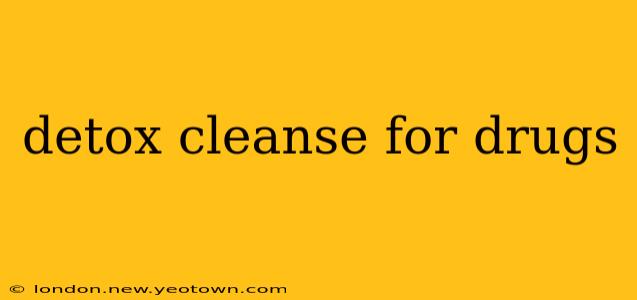The decision to pursue a drug-free life is a courageous one, and it often involves navigating the complexities of detoxification. This process, while challenging, is crucial for long-term recovery and overall well-being. Understanding what a detox cleanse entails, its limitations, and the importance of professional guidance is paramount. This guide explores the multifaceted nature of drug detoxification, providing crucial information and dispelling common myths.
It's incredibly important to state upfront: attempting a drug detox cleanse at home without medical supervision is extremely dangerous and potentially life-threatening. This article is for informational purposes only and should not be interpreted as medical advice. Always consult a healthcare professional or addiction specialist before undertaking any detoxification process.
What is a Drug Detox Cleanse?
A drug detox cleanse aims to eliminate toxins and substances from the body after prolonged drug use. The process typically involves medically supervised withdrawal management to minimize uncomfortable symptoms and ensure safety. This is vastly different from unregulated "cleanses" promoted online. These often lack scientific backing and can be harmful.
Imagine the body as a complex machine. When exposed to drugs, it's forced to work overtime to process and eliminate these foreign substances. A proper detox helps the body reset, allowing it to recover and function optimally again. However, this reset isn't a simple process; the severity of withdrawal symptoms depends on the type and duration of drug use.
What are the Different Types of Drug Detox?
There isn't a one-size-fits-all approach to detox. The specific method depends on the drug(s) involved and the individual's health condition. Some common detoxification approaches include:
-
Medically Supervised Detox: This involves inpatient or outpatient treatment in a facility with medical professionals monitoring vital signs and managing withdrawal symptoms. Medication may be used to ease the process. This is the safest option.
-
Inpatient Detox: Requires residing at a treatment facility for 24/7 monitoring. It's ideal for individuals with severe addiction or complex medical needs.
-
Outpatient Detox: Allows for regular visits to a clinic or hospital while living at home. It's suitable for those with milder addictions and support systems.
How Long Does a Drug Detox Take?
The duration of a detox cleanse varies significantly depending on several factors:
-
Type of Drug: Opiates, for instance, can cause significantly longer and more intense withdrawal periods compared to other drugs.
-
Frequency and Duration of Drug Use: Heavier, long-term users generally experience more protracted and difficult withdrawals.
-
Individual's Health: Underlying medical conditions can influence the detox process and recovery time.
The process can last anywhere from a few days to several weeks. It's crucial to understand that this is just the first step in recovery.
What are the Symptoms of Drug Withdrawal?
Withdrawal symptoms vary significantly based on the substance abused but can include:
- Nausea and Vomiting
- Severe Headaches
- Muscle Aches and Pains
- Anxiety and Depression
- Insomnia
- Sweating and Chills
- Seizures (in severe cases)
These symptoms can be extremely distressing and even life-threatening, highlighting the critical need for medical supervision during detoxification.
What Happens After Detox?
Detox is only the initial phase of recovery. Successfully completing detox doesn't automatically equate to long-term sobriety. It's followed by critical rehabilitation stages involving therapy, counseling, and support groups to help individuals address the underlying causes of addiction and develop coping mechanisms. Continuing care, such as aftercare programs, significantly increases the chances of sustained recovery.
Can I Detox at Home Safely?
No. Attempting a drug detox at home without medical supervision is incredibly risky and should be strongly avoided. Withdrawal symptoms can be severe, and medical complications can arise unexpectedly. Professional medical support is essential to ensure safety and manage potential emergencies.
What are the Risks of DIY Detox?
DIY detox methods are often ineffective and can be incredibly dangerous, leading to:
-
Severe Withdrawal Symptoms: Unmanaged withdrawal can be excruciating and potentially fatal.
-
Medical Complications: Without monitoring, serious health issues could go undetected and untreated.
-
Relapse: Improper detoxification can hinder the recovery process and increase the likelihood of relapse.
Successfully navigating the challenges of drug detoxification requires a comprehensive and personalized approach that prioritizes safety and well-being. Remember, the path to recovery is a journey, and professional support is invaluable every step of the way. Seeking help from a healthcare provider or addiction specialist is the most crucial first step towards a healthier, drug-free future.

